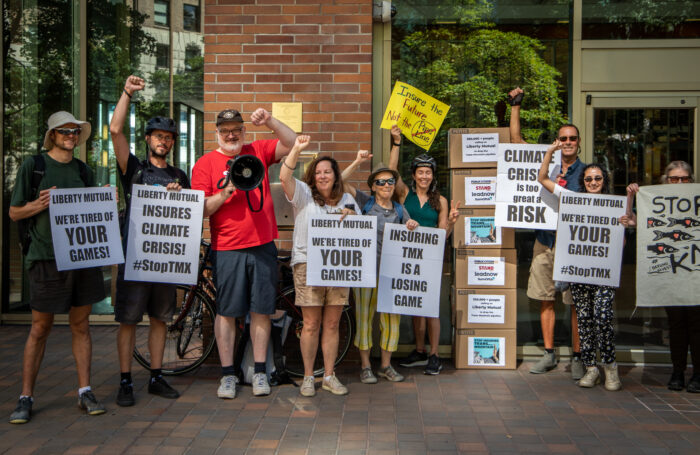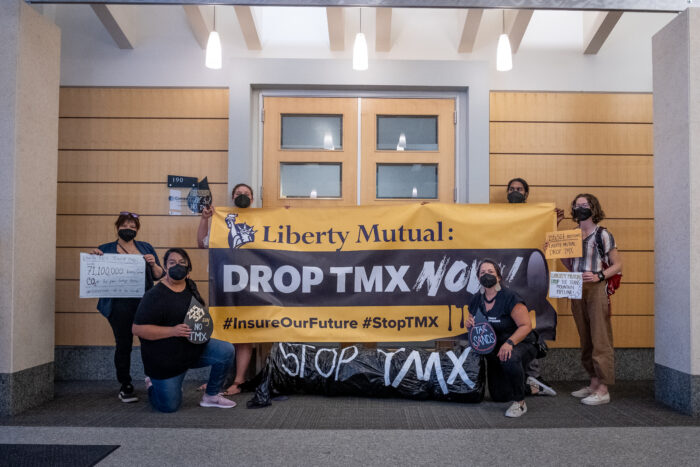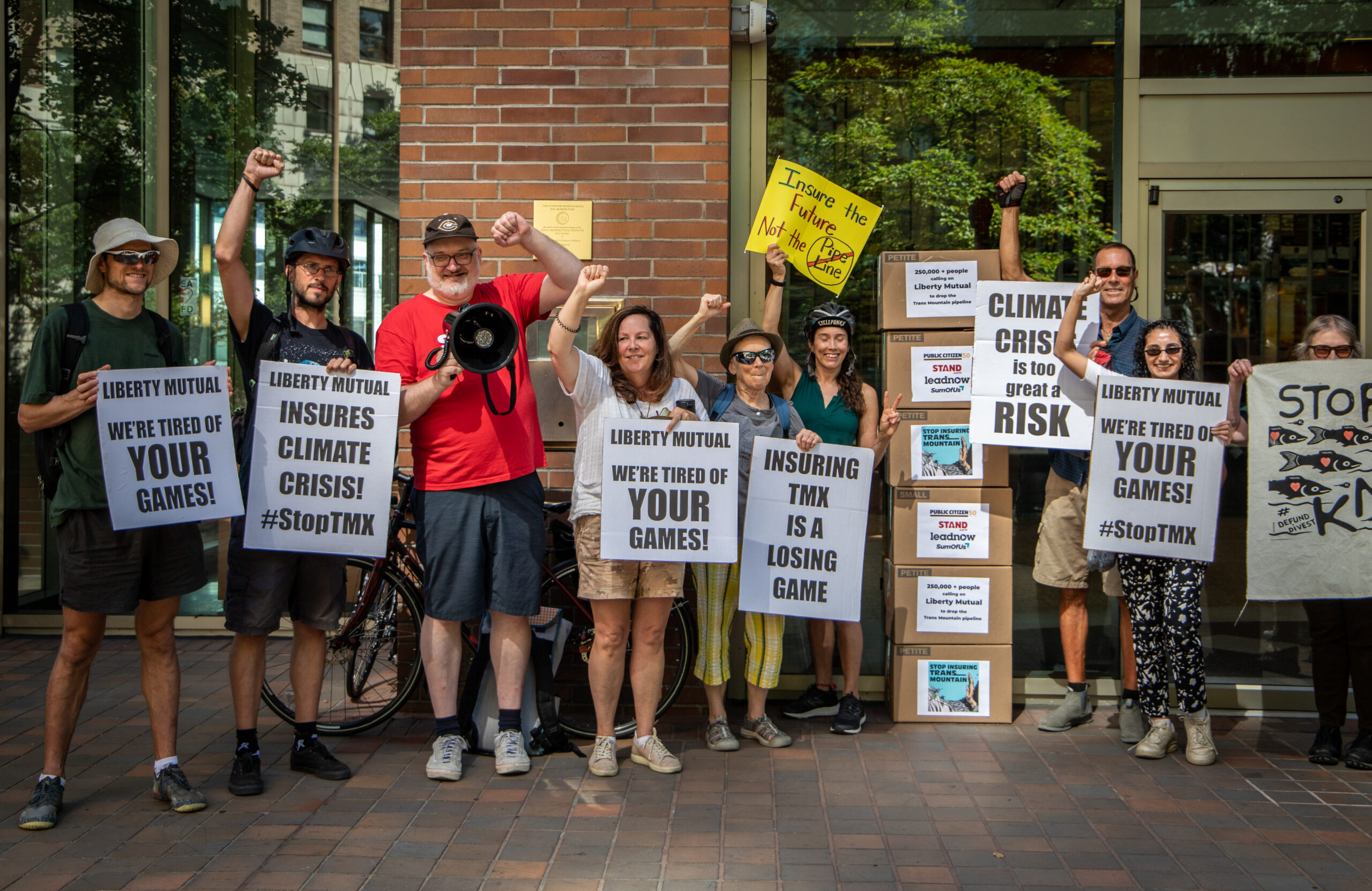As August 31 deadline nears, hundreds of thousands demand that Liberty Mutual rule out insuring tar sands expansion
August 24, 2022 (Boston, MA, USA) – As Trans Mountain seeks to renew insurance coverage for its pipeline operations for 2022-23, Indigenous Peoples, communities, and climate activists worldwide are calling on Liberty Mutual to rule out insuring the Trans Mountain expansion project and the tar sands sector more broadly. Across the US and Canada, activists are delivering more than 255,527 petition signatures urging Liberty to rule out any insurance support for the pipeline company this week.
Insurance is a prerequisite for the existing pipeline’s continued operation and for the operation of the expansion. With Trans Mountain’s current insurance certificate expiring August 31, the pipeline is down to the wire to finalize its next policy.

“By continuing to underwrite tar sands extraction and pipeline projects that have not obtained Free, Prior, and Informed Consent, Liberty Mutual is guilty of Indigenous rights violations. Liberty must cut ties with the Trans Mountain pipeline when its policy is up for renewal at the end of this summer,” said Kanahus Manuel, a Secwepemc and Ktunaxa land defender with the Tiny House Warriors. “Our blockades, asserting Indigenous jurisdiction, are the biggest financial and economic risks to this project, as we challenge the government of Canada’s legal right to build this pipeline through unceded Aboriginal title lands. Liberty Mutual will face Indigenous resistance if it continues to insure tar sands infrastructure including pipelines, pumping stations, marine terminals, and tankers.”
Pressure from Indigenous nations to drop the project is working. Eighteen insurers have committed to not insure the Trans Mountain expansion project or cut ties, most recently Aspen and Arch in the spring of this year. As the number of insurance companies with the expertise and risk appetite for insuring tar sands dwindles, activists are calling on Liberty Mutual to rule out support for the pipeline, as it is one of the remaining insurers listed in the most recent public certificate that has yet to comment publicly.
“Liberty Mutual has failed to rule out underwriting tar sands expansion, but apparently has no problem canceling homeowner’s insurance policies in the wake of mounting climate risks.” said Chris Wilke, Waterkeeper Alliance, referencing Liberty Mutual’s cancelation of homeowner policies in California after the state was ravaged by wildfires. “Other insurance companies know what causes these disasters and how to avoid fueling the fire – so they’ve dropped Trans Mountain Pipeline and tar sands generally. Why won’t Liberty Mutual?”
In Boston, Seattle, Vancouver, Toronto, and Denver, dozens of people, including youth, impacted communities, and physicians are gathering at Liberty offices across North America to hand deliver the petition during a week of action August 22-26. In Boston, where Liberty Mutual is headquartered, they plan to project photographs from online expressions of solidarity onto offices of executives. Hundreds of people from around the world are flooding the social media of the company with the demand to drop the project, using the hashtag #LibertyDropTMX, including famous authors, youth activists from India, Sierra Leone, Burnaby Canada, organizers from the South Pacific, and visual artists.

In addition to community pressure, insurers have numerous reasons to distance themselves from the pipeline network. Aging infrastructure, ballooning costs, safety concerns, the danger of becoming a stranded asset, and Indigenous resistance all present significant financial and reputational costs for companies.
“Extreme floods nearly washed out the Trans Mountain pipeline last year. The climate crisis is already here and this project is an existential threat to the Tsleil-Waututh Nation. Insurance companies must drop coverage of Trans Mountain now, and recognize the violation of Indigenous rights as a material risk,” said Charlene Aleck of the Tsleil-Waututh Nation Sacred Trust Initiative.
The pipeline project is currently less than halfway built, years behind schedule, and needed a $10 billion loan guarantee from the Federal Government to cover growing construction costs that now top $21 billion. Analysis by the Parliamentary Budget Office and Institute for Energy Economics and Financial Analysis (IEEFA) have previously called into question whether the pipeline is viable at this construction price, and predicted that taxpayers will have to continue to pour money into the project if it is to be completed. In addition to the ballooning costs of this pipeline project, the UN Secretary General recently referred to any investment in new fossil fuels infrastructure as “moral and economic madness.”
“Empty promises about carbon emissions from insurance companies mean nothing when your home is flooded away, or when people in your town die from heat stroke caused by climate chaos,” said Mary Lovell, Insurance Campaigner with Rainforest Action Network. “You’d think insurance companies would want to protect us from harmful risk, not expand it the way Liberty Mutual is doing by insuring projects like this.”
Quotes from Coalition Partners
- “In addition to growing public objections Insurers should review the “safety” reports submitted to the CER by Trans Mountain. They are rife with careless and avoidable accidents which have caused one death and serious bodily harm. Insurers need to ask themselves how much risk they are willing to incur,” said Lynn Perrin, Pipe Up Network. (Read the report here.)
- “The proposed Trans mountain pipeline expansion poses a serious risk not just for endangered Southern Resident Killer Whales but also endangered Pacific salmon and the many Salish Sea indigenous communities, seafood industries and others that depend on a healthy ecosystem. The projected 700 percent increase in oil tanker traffic from the proposed expansion will cause marine disturbances that will have serious detrimental impacts on the marine inhabitants and communities around the Salish Sea. Liberty Mutual must take a stand to divest from this project”
said Marcie Keever, Oceans & Vessels Program Director for Friends of the Earth U.S.
- Liberty Mutual’s failure to stop underwriting tar sands infrastructure and the Trans Mountain pipeline means it has an outsized role in perpetuating pollution and the climate crisis.” said Shawna Foster, a spokesperson for Rainforest Action Network. “The science is clear- we have a short time to act before climate impacts are locked in for centuries: droughts and wildfires in some areas, flooding and superstorms in others, loss of glacial ice and sea level rise pushing communities to the brink. This is the road to human displacement and widespread extinction. Liberty Mutual must correct its course before it’s too late.”
- “An oil spill from a vessel that’s passing through the San Juan Islands would have devastating effects on our waters and shorelines, our marine ecosystems, our communities and economy, the endangered Southern Resident killer whales, and so much more. The Trans Mountain project is a disaster for the climate, and for us, here in the San Juan Islands, the project threatens our way of life. We call on Liberty Mutual and every insurer to look beyond short-term financial gain and do the right thing: Drop TMX,” said R. Brent Lyles, Executive Director, Friends of the San Juans.
- “We are taking action to add our voices to the over a quarter of a million people who are calling on Liberty Mutual to stop doing business with the Trans Mountain pipeline,” said Sven Biggs, Canadian Oil and Gas Program Director with Stand.earth. “Once again this summer, we have seen record breaking temperatures, raging wildfires, droughts, and multiple “once in a century” floods. The executives at Liberty Mutual know that building new oil infrastructure will only make this crisis worse, but they are choosing their short term profit over the safety of our communities.”
- “TMX will never be ‘de-risked’ and should not be insured”, says Sara Ross of the Community Nest Finding Network, one of the many grassroots groups on the ground in BC fighting Trans Mountain. “We remain committed to using any and every tiny hummingbird or spawning salmon to stop this colonial & planet-killing project. The United Nations has told Canada to stop construction of TMX until Indigenous consent is honored. Drop TMX or pay the price of an ongoing slow and painful defeat.”
